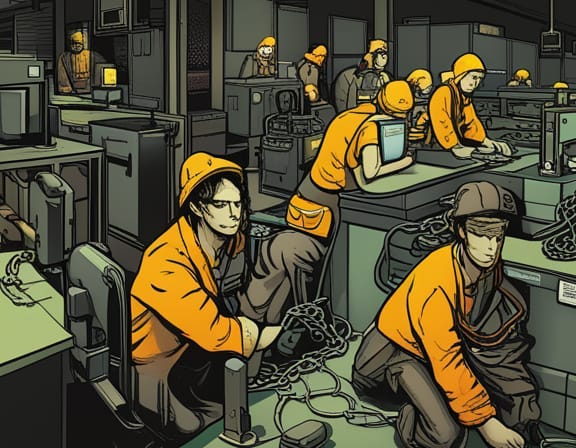Last time on Radio Free Pizza, I coined the term “cultural austerity” while in production on that dispatch. Or, in truth, I only thought I coined it. I’m glad I didn’t try to take credit for it, because I’ve since found out my predecessors were numerous.
Fortunately for my ego, my brief research so far hasn’t revealed any authors who used the term in quite the same sense. Following after the research of Clara Mattei, I meant it to indicate when economic interests launch projects of social engineering to subvert and undermine working-class political movements in the interest of maintaining the status quo. Of course, my predecessors used the term in different contexts, but in what I interpret as adjacent senses:
In the title of a 2021 essay collected by MIT Press examining designs, inventions, and artworks from the Azraq Refugee Camp in Jordan
In the title of a 2018 paper in New Zealand Sociology arguing (perhaps through a lens similar to Louis Althusser’s), “that schools must play a central role in instilling a critical consciousness during times of neoliberal socio-economic inequality, cultural austerity and political authoritarianism”
In the title of a 2013 book that (as Tracey Jensen’s 2015 review puts it) examines “cultural austerity romances” and in them finds “that high levels of consent have been secured for ‘austere’ policy-making”
The most senior of that trio, The Cultural Politics of Austerity: Past and Present in Austere Times by R. Bramall, only deploys the term “cultural austerity” once, as you can confirm in the full text: “One significant theoretical frame that might support a refusal to engage with the terrain of popular cultural austerity,” she writes, “is the longstanding position of antipathy towards ‘market-based cultural consumption’ [...] associated with the political economy approach to media and culture.”

Most likely, the “political economy approach” that Brammall has in mind is the political economy of communication, a branch of media studies that investigates the relationship between media institutions, communication technologies, and the broader political and economic systems. This approach focuses on how media ownership, control, and regulation impact the content, production, and distribution of information and entertainment, emphasizing the influence of economic and political forces on shaping media landscapes and the implications it has for democratic processes, cultural expression, and public discourse.
These influences would in some fashion account for the manufacturing the consent of an audience for austerity policies through arts and entertainment. Such would be the aim, I’ve argued previously, behind 21st-century projects of social engineering, which are apparently likely to find support among theorists of what Brammall calls “market-based cultural consumption”—a term that her bibliography credits to 1992’s Cultural Populism, by Jim McGuigan.
As his publisher tells us, McGuigan explores “[t]he populist sentiments and impulses underlying cultural studies and its postmodern variants” and identifies “[a]n exclusively consumptionist trend [...] shown to be an unsatisfactory means of accounting for the complex material conditions and mediations that shape ordinary people’s pleasures and opportunities for personal and political expression.” Accordingly, he makes his case “for recovering critical analysis of popular culture in a rapidly changing, conflict-ridden world.”
Of course, that was in 1992. Writing some two decades later, McGuigan’s “From cultural populism to cool capitalism” (2011) follows the development of that aforementioned “consumptionist trend” and investigates its consequences in the present day. In the interval (the abstract tells us), the field’s “increasing concern with describing and indeed celebrating processes of cultural consumption” meant that cultural studies “lost sight of economic and political struggle over the circulation of culture in society” and “became less concerned with questioning the status quo and unwittingly, in effect, endorsed neo-liberal development over the past thirty years.”
In the language of our recent dispatches, it seems, we could say the field of cultural studies has become a vector of cultural austerity reinforcing the capital order.

McGuigan expands further on what he means by the “consumptionist trend” in cultural studies in “The Coolness of Capitalism Today” (2012):
Consumptionist Cultural Studies attributed an inordinate measure of agency to the consuming subject and, now with the advent of interactive, social-networking media, to the producerly consumer [...] These hyperactive consumers, shoppers, readers, listeners, viewers, spectators, cybersurfers and, latterly, citizen journalists, bloggers and so on bear a striking resemblance to the sovereign consumer of neoclassical economics, the core ideological assumption of neoliberal, “free-market” capitalism. The customer as king or queen is the endlessly repeated mantra of neoliberalism, as though giant corporations were really beholden to the whims and wishes of ordinary people rather than [being] the masters of the Universe.
For McGuigan, however, consumers demonstrate far less authority than neoliberalism purports to confer upon them. In fact, he writes, “[i]t is the producers who […] cultivate the tastes and habits of consumers. Yet, neoliberalism insists upon flattering our vanity as it picks our pockets.” While the ideology of the capital order would have it that consumer demand will dictate supply, and that market efficiency sets the pace of social progress, “only a very small number […] would actually be in possession of enough money in any case to buy whatever they want.”
Through the lens of Brammall and McGuigan, then, cultural austerity consists of social engineering to promote choices and behaviors among consumers that reinforce the current socioeconomic relations and the political structures that support it.
(I believe the idea should be familiar enough to anyone who has ever observed the irony of finding T-shirts emblazoned with portraits of Chairman Mao or Che Guevara for sale in a department store known to stock the products of child labor.)

In my view, the identity politics and woke culture movements of the past decade have served precisely this function: to manufacture consent for the capital order.
Of course, McGuigan was not the first to observe that “cybersurfers and, latterly, citizen journalists, bloggers and so on” would stand as the supposed beneficiaries of social engineering projects professing to empower individuals as the ‘sovereign consumers’ of the cultural marketplace. Among his predecessors seems to stand—surprisingly or unsurprisingly—Jonah Peretti, founder of BuzzFeed.
From Dylan Matthews’ reporting in 2014, the website owed much of its success to its “remarkable talent at relating to people.” Matthews cites BuzzFeed’s former chief creative officer, as quoted in a New York Magazine profile of the company’s founder, for encapsulating the website’s philosophy: “‘Nobody wants to be a shill for your brand’ […] ‘But they are happy to share information and content that helps them promote their own identity.’”
Though it’s scant evidence, I suspect anyone on social media who has ever impulsively shared some intellectually vacant content will see their behavior prove that very principle.
The aforementioned magazine profile revealed Peretti’s own 1996 contribution to cultural theory, in which the BuzzFeed founder argued:
Identity formation is inextricably linked to the urge to consume, and therefore the acceleration of capitalism necessitates an increase in the rate at which individuals assume and shed identities. The internet is one of many late capitalist phenomena that allow for more flexible, rapid, and profitable mechanisms of identity formation.
Or, as Matthews summarizes it: “going forward, capitalism will need to be constantly producing identities for people to adopt at an ever-increasing rate. And now Peretti’s at the helm of a firm that’s doing exactly that.”
Indeed, fulfilling Peretti’s foresighted conception of late-stage capitalism at the internet’s advent, I believe that personal identity has become a product selected from those available to consumers on the cultural marketplace. Hence, ‘identity politics’: ostensibly an effort to address the unique challenges and inequalities experienced by marginalized or underrepresented social, racial, ethnic, gender, or other identity-based communities through what we might call ‘cultural capital price controls’ on various potential identities available to an individual, this identity politics has in fact proven an engine sowing division and essentialism while overshadowing broader social issues and undermining a sense of solidarity or shared struggle among the working class.

Of course, the professional-managerial dialect, adopted in the corporate sector and in liberal outlets of the mainstream media, caters to the primacy of personal identity. Certainly that dialect has also served to reinforce consent for the capital order.
As discussed in our last free dispatch, changing the language and terminology of public discourse surrounding critical social issues—predictably enough, at least with hindsight’s handicap—has further polarized the population and accelerated the growth of its internal divisions along ideological lines. Not yet mentioned, however, is an overlap (which many of you will have surely noted already) between the professional-managerial dialect and the Newspeak of 1984 in their efforts to standardize and control language and discourse. In our world, however, the transformed lexicon of terms and expression hasn’t been imposed by an authoritarian state to promote uniformity of thought. Instead, the professional-managerial dialect (as its name implies) gained traction with the corporate sector’s promotion, and became prevalent through such social rewards.

Darren Allen, featured in one of our first dispatches, has something to say about Newspeak: “The problem is not that we are forced to speak Newspeak, but that we live in a manner from which it automatically emerges, a way of life which makes speech meaningless […] the radical impoverishment of the lives we live is automatically reflected in the radical impoverishment of our speech.”
Reflecting on our language’s former richness and capacity to convey the depth and variety of existence, the professional-managerial dialect and its siblings—like the rationalist dialect of scientism that Allen calls “Technospeak”—leave us with a diminished capacity for experience and a comparably reduced chance for attaining personal fulfillment.
On what I've called the professional-managerial dialect, Allen cites Norman Finkelstein (also featured in a past dispatch) in a footnote to what he calls “the dialect [that] has metastasised into wider society [...] called ‘woke’”, writing in that footnote that the dialect now “forms the political base of left wing political parties, who abandoned the trade-union movement.”
Locating what he calls “the petrification of metaphor” as a primary aspect of the decline in our shared language, Allen proposes that the loss of living metaphors results from the erosion of genuine experience in modern lifestyles disconnected from nature and real interaction. The living metaphor, he argues, constitutes “a way of expressing a new quality by bringing together two incompatible ideas which share that quality”—such that removing these metaphors from our language reduces communication to literal expressions devoid of genuine meaning, with a concomitant decline in meaningful experiences available to the individual.
For Allen, ‘a language devoid of meaning’ perfectly describes the professional-managerial dialect:
The reason why [...] implicit meaning must, in highly developed Wokespeak, be conflated with explicit communication, is that there is no implicit meaning left in the lives of those who speak it. They have no quality to draw from by which to interpret speech, so they have to parse, and police, its formal expression. This is why Wokespeakers are […] so extraordinarily uncreative and humourless, and why […] our social lives have become drained of the prerequisite for culture, playfulness.
I believe it’s worth noting here that, for Allen, policing others’ speech reflects a personal impoverishment. Regardless of its speakers’ experiences, however, our contemporary Newspeak clearly differs from Orwell’s in its implementation. Rather than being imposed by the state—though recent legislation proposed in Michigan seeks to address the years-long public debate—the development of the professional-managerial dialect proceeds from its speakers’ own alienation: from their lives’ poverty of meaning.

Allen elaborates further on these origins, and on the symptoms of the resulting pathology:
[T]he compulsion to speak an antiseptic unlanguage, stripped of implication [comes] from the wider postmodern culture [...] in which words […] in being entirely self-referential, take on the status of reality itself. Language, in postmodern thought and culture, only means itself, which is why critical speech […] is conflated with actual violence, and why the act of telling the truth is defined as literal terrorism. Postmodern man is nothing but a self-definition, an ‘identity’ or mask.
(Need I emphasize any further the reduction of a person to [mere] “identity”?)
As you might guess, Allen also points to the widespread awareness and enforcement of cancel culture as a contributing factor in the decline of nuanced language and open discourse. However, he cautions against blaming cancel culture entirely. Instead, he argues, that decline is:
[A]n automatic consequence of our postmodern existence, in this case the breakdown of boundary and limit, which the highly developed technological system, which has no use for the borders the same system required to build itself, forces upon us. Distinctions which separate states, institutions, genders and people—including the border between my subjective self and the objective world—must be broken down by an increasingly virtual system which is hampered by them, leaving a kind of apocalypse of meaning, reflected in the absurd ideologies and senseless languages of the postmodern system.
Allen’s essay doesn’t cover what I’ll call the traditionalist-reactionary dialect that researchers for the National Bureau of Economic Research and for Carnegie Mellon University supplied the data for us to identify as a complement to its liberal competitor. (I’ll eventually have to update these terms, I suspect, but I’ll go with it for now.) So, after having spent my last dispatch critiquing the professional-managerial dialect, I’ll turn my attention now to its principal opponent in the American duopoly.
For an example of the traditionalist-reactionary dialect, please enjoy the following clip that so delighted me when last month I happened to chance on it:
That’s Roseanne Barr, in a March 2023 interview with Alex Jones, responding to the host’s question of what she’d advise “the globalists” to do: “They [must] step aside,” she answers, and calls instead for “the people [to] own the means of production of everything—not the communist way.”
Though she speaks with more nuance in context, Barr’s words here still bowl me over. I felt pretty confident before that communism revolved around popular ownership of the means of production, but just to make sure, I took it to ChatGPT and asked, “What are ‘the means of production’?”
The term “means of production” is a concept used in Marxist theory to describe the resources and tools required to produce goods and services in a society. In the context of capitalism, the means of production are typically owned by the capitalist class, while the labor force, which does not own the means of production, sells its labor to the capitalist class in exchange for wages. […] Karl Marx argued that the capitalist class’s control over the means of production allowed them to exploit the labor of the working class, extracting surplus value from their labor and accumulating wealth. According to Marx, this unequal ownership and control of the means of production created class conflict between the bourgeoisie (capitalist class) and the proletariat (working class). Marx’s vision was for the proletariat to eventually seize control of the means of production through a revolution, leading to a classless society where the means of production would be collectively owned and controlled. This concept is central to Marxist ideas of socialism and communism.
For the sake of brevity I redacted various examples. Part of me thinks I could have redacted the whole response, feeling well enough acquainted with the concept that it has assumed an air of common sense, but I hope you see the point: in the above clip from her interview, Barr advocates precisely for communism in the same breath that she denounces its name.

I’ve seen a couple other examples in recent years of conservatives demonstrating a misunderstanding of communism:
In 2021, Rep. Marjorie Taylor Greene (R-GA) said the Biden Administration represented a “communist takeover” of the United States due to his business dealings with state-owned enterprises from the People’s Republic of China—at least, I think that’s what she meant. (The theme appeared again in her 2022 campaign’s fundraising emails that described Biden’s “scheme to impose socialism on America,” as Stuart Rothenberg reported.)
In the same year, Sen. John Kennedy (R-LA) called the Administration’s proposed $1.9 trillion covid-relief stimulus bill “a left-of-Lenin, neo-socialist wish list” for the funding it supplied for unrelated projects like preserving Native American languages. (Alright, he didn’t use the word “communist,” but give me a break: he’s definitely invoking the tradition.)
In comparison to Barr’s aforementioned interview, however, these instances of hyperbolic political messaging don’t offer the same depth of content out of which I can improvise what I might call a diaphoristic analysis.
Before I begin, recall for a moment the study mentioned above for Carnegie Mellon University, as covered in our last dispatch. In those researchers’ sets of “misaligned pairs” (some of which “map to the same entity […] while the rest map to completely different entities and beliefs”), the ideological term “communism” in liberal discourse maps in conservative discourse to “Nazism.” Surely that would come as some surprise to German communists of the 1930s, being among the first imprisoned in Nazi concentration camps.

We could say, therefore, that while the professional-managerial dialect attempts to expand the variety of entities encompassed under the term “woman,” the traditionalist-reactionary dialect attempts to collapse fundamentally opposed beliefs under the term “communism.”
But, rather than wasting any more time on the theoretical contradictions and historical conflicts between those ideologies, I should return to Barr’s interview to see what she means when she uses her umbrella term.
Unfortunately, for the task of my diaphoristic analysis, she doesn’t use it often in her interview. Luckily, however, I had the chance to hear more of her call for popular ownership of the means of production: “…not the communist way,” she says (at ~3:16:35 in the full video), and elaborates, “not that crap, because that’s still oppressive”—so we know, at least, that Barr doesn’t necessarily assert that the globalists whom she and Jones denounce either practice or preach communism.
However, Jones tellingly adds, “Notice how we have corporate using communism to seize control of production. It’s a fraud.”
Barr agrees and says, “Corporatism and all that stuff is against tribal people’s rights.”
One sees here an example to substantiate our point above about how the traditionalist-reactionary dialect of American English distinguishes itself from the professional-managerial variant in its predilection for mapping two competing ideologies (here, communism and corporatism) to the same noun. Though Jones speaks of how “corporate” uses communism, and so we might grant him license to speak so reductively out of necessity, to describe an unforeseen historical contingency, I don’t feel generous enough now to go too far into it: suffice it to say that “corporate” already had production.
Still, it’s curious to note what else it is besides the popular ownership and oversight of production that Barr associates with communism. The only other time she refers to it (at ~2:45:40) is to assert that “collective punishment [...] is a part of communism […] it’s satanic, and Marx himself he loved the devil.”

(As amusing as I find ideas like that quote’s closing assertion, I’ve listened to this interview twice now and I’m feeling pretty sick of it, so let’s assume that, indeed, throughout those two hours she only mentions communism twice. Still, it’s worth mentioning for our argument that, at ~3:18:47, Barr expresses admiration for the aforementioned Rep. Marjorie Taylor Greene [R-GA].)
Barr’s reference to “collective punishment” as an attribute of communism brings to my mind the conclusion, touched on in our last dispatch, of David Rozado’s investigation into OpenAI’s content moderation system, in which he finds that it “often, but not always, is more likely to classify as hateful negative comments about demographic groups that have been deemed as disadvantaged.”
Since, in the traditionalist-reactionary dialect, both corporatism and communism fall under the same umbrella, we’d be at no fault for assuming that “collective punishment” becomes an attribute of corporatism too. In this dialect, then, the ‘systematically disadvantaged group’ is no demographic other than that which has suffered collective punishment beneath an ideological regime.

Early on in the interview (at ~1:43:50), Barr describes those whom she sees positioned as both the beneficiaries and the executors of a collective punishment—maybe thinking of Zbigniew Brzezinski, Henry Kissinger, George Soros, and Klaus Schwab as their portraits appear in the video—while also speaking of their vulnerabilities:
They forget, the power structure, this big pyramid [...] that they’ve constructed, the money people, I’m talking about the people that own the world, they forgot that the big old base that holds them up has to be composed of living human beings. I guess they’re gonna replace ’em with cyborgs or robots or something, I don’t know what, or maybe just clones of people who really don’t have any ties to each other, who can’t do anything but attack or work [...] that was the Nazis’ dream ]...] Every penny on this Earth is accounted for and it all goes back to the Bank for International Settlements [...] the same people are getting the same money from the same guys [...] the cartel people are getting paid by the same people [...] Big Pharma, Big Military, they’re all getting the money from the same guys [...] there’s only one source of money and they’re all getting paid by that same money.
(Naturally she compares them to Nazis. Following after the researchers for Carnegie Mellon University, I suppose a liberal speaking on the same subject would call such the communists’ dream.)
Jones agrees with Barr (at ~1:45:25), and supplies his own details: “The [Bank for International Settlements], after World War II, and the Marshall Plan, is the global system. And it’s running China, it’s running all of it, and it’s bringing out this new Central Bank Digital Currency that tracks and controls everything.”
In other words, Barr and Jones indicate some of the international structures supporting the global capital order, and they describe how these institutions serve to enrich (among others) firms controlling the pharmaceutical and defense industries as oligopolies. (For our purposes here, we’ll ignore for now the obligation to fact-check the specific institutions they name.) Indeed, Barr’s further description (at ~2:40:42) of U.S. political leaders—and their policy’s results—indicates that, whatever name she might have for the ideology of today’s international ruling class, her targets remain neoliberal economic policy and neoconservative foreign policy:
Our so-called leaders who are all just paid prostitutes of cartels [...] they’re taking our taxes and [...] they’re putting public money into private pockets [...] and then they go and sell weapons to both sides of every skirmish across the seas and they’re all making money on all of it [...] They start wars and arm both sides and pretty soon everything has a KFC and a Banana Republic [...] You don’t get a billion dollars without screwing over innumerable amounts of people. You just don’t.
Barr charges that our political leaders arrange for the transfer of public funds into the hands of the private interest “cartels” which count them as assets. Among these cartels presumably number the firms controlling oligopolies mentioned above, of which those in the defense industry profit from the imperialist machinations of the military-industrial complex that devastate foreign countries, before the firms of other oligopolies invest in the reconstruction of those countries in cooperation with their new governments—each one, of course, much more friendly to business than their predecessors.

In these and other points, Barr in fact sounds like more of a revolutionary than you might have expected. She emphasizes the opinion that closed the immediately preceding quote again at ~2:43:09, saying flat-out, “It isn’t moral to have a billion dollars.” Obviously, that hardly sounds like a defense of capitalism: in fact, Barr’s reference to exploiting the masses in the quote above echoes the communist critique.
Of course, and less surprisingly, Barr proffers some generic apologia for private ownership of the means of production, saying (at ~3:10:30) of Henry Ford’s livable wages, “That’s real capitalism, that’s not this crony capitalism [...] We don’t have real capitalism [...] It isn’t supply and demand, it’s crony capitalism.” In line, too, with the expanded umbrellas of ideological nouns in the traditionalist-reactionary dialect, Barr says (at ~3:14:44) of the capital order’s ruling class, “What they’re trying to do is bring back feudalism. That’s what the one-world thing is, feudalism, with the few at the top of the pyramid at the expense of the many”—or, as we might say in whatever dialect I’m speaking here, the technocratic oligarchs of the capital order have been engineering austerity so they can maintain their inordinately advantaged positions from which to keep collecting rents.

Naturally, the variety of ideologies captured under the umbrella of “communism” in the traditionalist-reactionary dialect highlight the challenges in communicating across the partisan divides of contemporary political discourse. Perhaps frustrating our efforts further, it seems that Big Tech’s generative platforms promote the professional-managerial dialect. That seems like the implication, anyway: of Rozado’s aforementioned research into OpenAI’s content moderation system (finding it “more permissive of hateful comments being made about conservatives than […] about liberals”); of the different moods for biological sex and gender identity in which OpenAI’s ChatGPT defined “woman”; and—given what we’ve heard now from the traditionalist-reactionary dialect—of the facility with which ChatGPT conveyed the fundamental opposition between communism and capitalism in its definition above for “the means of production.”
I find it noteworthy how the divergence between the professional-managerial and traditionalist-reactionary dialects demonstrate such a curious asymmetry. In the former, it seems, the meaning of a term previously referring to an individual and personal entity has expanded to encompass members of additional demographics who attest to identities with (and, I suppose, are deemed to suffer) equivalent disadvantage, with definition varying between context and mood. In the latter, meanwhile, abstract nouns referring to ideologies codified extra-contextually—even those with fundamental oppositions that resulted in historical military conflicts between states practicing these competing ideologies—become more or less interchangeable, so long as one or more of the states practicing each ideology have been oppressive.
Of course, I can’t call that finding conclusive. Nonetheless, it’s valuable to observe that these ideological dialects diverge here according to their speakers’ different predilections for framing disadvantage and oppression:
For the professional-managerial dialect, the modified term denotes disadvantaged victims of oppression, with economic class (from Rozado’s discovery that OpenAI’s content moderation system will more likely find permissible negative comments about any class) evidently suppressed in consideration;
For the traditionalist-reactionary dialect, the modified term denotes a broad spectrum of competing ideologies that oppressive states have organized around and/or which oppressors have used to justify themselves.
In the modern context, however, I believe the oppressive state that Jones and Barr’s globalists officiate is none other than the super-national regime that I’ve been calling the global capital order. Whether one terms its organizing ideology ‘fascist corporatism’ or ‘neoliberal capitalism’ or anything else, the expansion of this dictatorship of international finance—capable, it seems, of subjugating even nation-states—has increasingly privatized both the means of production and state services across the globe, enriching the infinitesimal minority whom those technocratic oligarchs represent, while its worldwide operations impoverish the masses even (through cultural austerity) at the level of public speech.

Obviously, promoting these divergent changes to language through social engineering serves that oppressive supra-national regime: we’ve covered before how the framework of ESG finance has promoted the professional-managerial dialect, identity politics, and woke culture, with the consequence of handicapping populist movements to address wealth inequality. For the traditionalist-reactionary dialect, it’s not difficult to imagine that private interests behind conservative platforms (such as, conceivably, the Genesis Communications Network that syndicates Alex Jones’s broadcasts) would also use their influence aim to suppress and confuse the discourse surrounding topics like the popular ownership of the means of production—though for now this remains only a potential area for further investigation.
Regardless, the ongoing divergence of these dialects offers a profound example of cultural austerity. Recognizing that divergence obliges us, I believe, to critically examine the ideologies embedded within those dialects—and, therefore, those competing in our society. Language, politics, and identity intertwine in intricate ways, and feed back upon economic ideology, political consent, and societal narratives: understanding this behooves us to interrogate the circumstances of our own cultural austerity and to investigate what parties benefit from the erosion of meaningful communication observed in our society today. In doing so, we may find a potential path toward a culture of greater understanding and political unity.




